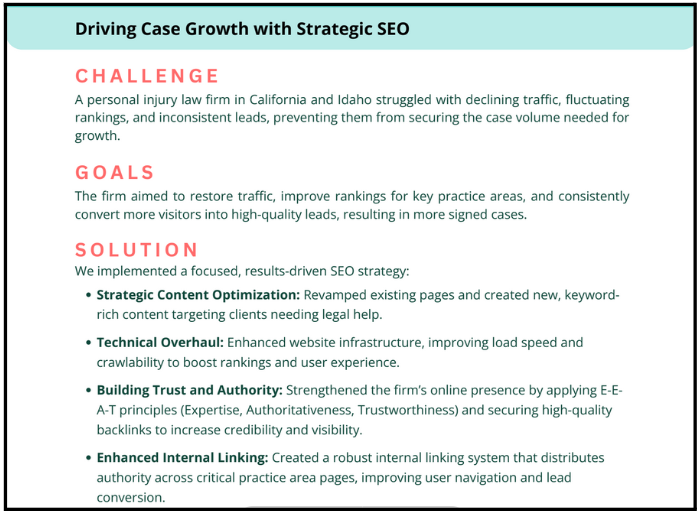“I have no idea what my last SEO agency was doing.”
We hear this all the time from law firms. You hire an agency, they make big promises, and then… silence, except for an occasional monthly update that tells you nothing. Sound familiar?
The problem? Lacking a clear, actionable roadmap. From the very start, your SEO agency should have a well-defined plan detailing what they’ll do, how much of it they’ll do, and when they’ll do it. Without clear deliverables, you’ll have no idea what the agency is doing. And if you’re not sure what the agency is doing, it’ll be harder to hold the agency accountable if you’re not seeing results.
Know the what, when, and how much
Clarity is the key to any good roadmap. It should break down how your SEO agency plans to use your budget to improve your rankings, impressions, traffic, and leads. It should detail how many hours (or what portion of your allotted word count) your law firm SEO agency plans to spend on each service or task, often split between on- and off-page tasks.
| On-page | Off-page |
|
|
|
|
|
|
|
|
|
But a roadmap that merely states your agency will do a monthly content strategy, write content, build backlinks, and complete tech audits is insufficient. Insist on a more detailed accounting of the agency’s planned work so you know what’s being done and when.
For example, a law firm without much website content might require more intensive content production for the first several months to build up its core, business-generating pages. The roadmap might call for 30,000 words in each of the first three months, for example, followed by 10,000 words in subsequent months.
Conversely, a site with significant technical problems might require more budget for technical fixes in the first months. It might outline 15 hours devoted to tech fixes for each of the first few months, followed by about 5 hours for subsequent months to maintain the site and address problems that might arise.
In any case, be sure you understand how the agency plans to use the budget. Some agencies outline their services ahead of every month, some plan quarterly, and others outline a full year. In every case, you should know what they’re doing and how much of it they’ll do.
But flexibility is important too. Your SEO agency should give you regular updates and be ready to pivot when strategies don’t work because, after all, SEO is more art than science.
Schedule regular check-ins to review progress
SEO agencies should hold themselves accountable. Their roadmap should budget for consultancy and reporting and set aside time each month to review progress.
While an SEO company should never promise specific results (e.g., ranking #1 for an ultra-competitive term in two months), it should be comfortable setting reasonable goals within a specific time period. Your monthly check-ins are a good time to review progress in reaching those goals.
If results fall short, the agency should be flexible enough to pivot.
For example, if your strategy of targeting a competitive area of Los Angeles isn’t improving your traffic, leads, or cases, your agency may need to alter its strategy. They might decide you lack the authority needed to rank in the ultra-competitive market in the short term. They won’t abandon efforts in the competitive market, but they may devote some budget to less-competitive markets in the area to drive traffic and get more leads while they work on building authority in the competitive area.
SEO strategies vary. What works for one website may not work for another. That’s why we follow a structured, transparent roadmap that keeps us accountable. We track milestones, anticipate challenges, and pivot when needed.
Understanding what kind of progress to expect is only one piece of the puzzle. Just as important is how the agency plans to get you there. That’s where a tailored strategy comes in.
Your roadmap should be customized for your law firm
SEO agencies should provide a custom strategy aligned with your market, practice, and goals. One firm may want to grow its monthly case volume, while another may be just starting out with a brand new website. One may be located in a small town, while another may be competing in New York City.
These firms need tailored strategies. Forcing either into a one-size-fits-all strategy spells disaster. As your SEO agency develops its roadmap, review it to make sure it reflects your law firm’s current needs, market challenges, and future goals. If not, you’ll likely end up paying for efforts that simply won’t work.
Let us illustrate this with three different examples.
3 firms, 3 goals, 3 roadmaps
Any good roadmap should start with communication. SEO tactics might be similar across websites, but knowing which levers to pull and how to pull them requires a thorough understanding of the website and the law firm behind it.
When we begin working with new law firms, we take time to learn about you and your website. We do a full site audit, but we’ll also talk to you about your business, pain points, and plans for the future. We review your current case volume and then establish a strategy that will help you reach your goals.
In most cases, our roadmap will include both on-page and off-page initiatives, but no two roadmaps are the same. If your SEO agency is delivering a standard roadmap that it promises works for all its clients, run.
A law firm starting nearly from scratch
- Challenge: Very little content, basic website, little to no previous SEO work.
- Short-term priorities: Possible site design and development, address technical issues, create foundational content, establish foundational backlinks and local citations, create GBP.
- Measuring success: Begin attracting leads and signing cases from the website.
As they’re starting from square one with very little content and a barebones site, this firm needs everything, but the priority will be completing the one-time setup tasks.
We start with our audit to understand the site and its problems and, knowing our client’s goals, establish a realistic timeline for results. We analyze the market and competitors to identify quick and effective ways to stand out. We’ll address any problems with website speed and performance, establish a logical site structure, and begin creating foundational content.
Once we’ve built a solid presence, we can expand with supporting content and backlinking strategies to strengthen their market position. If all goes well, our efforts will help them rank for lead-generating search queries so the firm can start signing new cases.
A clear roadmap that outlines this early work and sets expectations keeps us accountable and allows us to create backup plans if our efforts don’t pan out as we expect. Once we’ve created our roadmap, our client reviews it and we schedule regular meetings to review progress.
A law firm that needs technical fixes
- Challenge: The website is slow or has technical issues that hinder its search performance.
- Short-term priorities: Full technical review of the website, followed by fixes to address site speed and other problems.
- Measuring success: Aside from better technical performance, we’ll monitor if the technical efforts are leading to increased rankings, traffic, and, eventually, leads.
As always, the first thing we do is a site audit to learn more about the website and its problems. In this case, our roadmap would focus on web development and site fixes first. We’ll also review and address problematic site structure, possibly uncovering content gaps that we’ll address as we build a content strategy.
In the first months, we might emphasize site audits and technical fixes. In the following months, our roadmap might devote hours to technical work to maintain the site and address new problems that arise. We’ll review technical KPIs regularly and monitor how those technical fixes affect the site’s search performance, hopefully gaining more impressions and traffic.
As the technical issues are resolved, our roadmap will devote more hours and budget to growing the site. We’ll build a content strategy, revamp existing content and create new pages, develop backlinks, maintain Google Business Profiles (GBPs) for its local SEO presence, and pursue other strategies aligned with the firm’s goals.
By creating a detailed plan, we’ll establish how well our efforts are working and, if not, create a plan to remedy those issues. We’ll meet with the client to review our roadmap and make any necessary adjustments. We’ll then establish a schedule to meet regularly.
A law firm with content that is not performing
- Challenge: An established website with plenty of content isn’t ranking or driving traffic.
- Short-term priorities: Technical audit, content audit, backlink audit, content revamps, new content production, backlink acquisition.
- Measuring success: Monitor for improvements in ranking, impressions, traffic, and new leads and cases.
We have helped countless law firms in this situation. They have a website, sometimes with a wealth of content, but they’re not ranking in the search results, not driving traffic, and not signing new cases from the site.
As always, our first step is auditing their site to understand why the site isn’t performing. We’ll do a technical review of the site, audit the content to understand what might be holding it back, and review the site’s backlink profile.
Some of the common issues we encounter in our audits include:
- Content is thin or wildly underutilized in terms of optimizations such as schema
- Website lacks logical organization and structure
- The site loads slowly
- Backlink profile is lacking or poor quality
Once we’ve fixed any major technical issues, we may find that the content isn’t helpful to the reader. We’d implement a content strategy that prioritizes updates to existing content, new pages to fill gaps or support main pages, and possibly new content clusters to strengthen their authority in a preferred practice area. Our roadmap may also outline link disavows and backlink acquisition to fix and improve the site’s backlink profile, hopefully boosting the site’s authority.
What each firm needs is highly variable depending on the problems holding them back. Here’s a real-world example: A law firm struggled to get leads from its website. It saw traffic declines and flagging rankings in the months before they hired us. We outlined a roadmap to revamp current pages and create new ones, fix the site’s infrastructure, build high-quality backlinks, and improve the site’s internal linking.

Through our efforts, our client saw:
- A 270% increase in keywords ranking in the top 3 positions
- A 548% increase in keywords displayed in SERP features
- A 36-point site health improvement
Our early work enlightened us to the site’s problems, and our roadmap created a plan for addressing them one by one. Our client understood our plan, we met regularly to review progress, and we pivoted a few times based on the results.
Best of all, signed cases improved by 38% in less than 12 months. Thanks to lead attribution, we were able to monitor not only the SEO metrics that tell us if our efforts are improving visibility online but also whether those efforts are attracting users that convert into new business for the law firm.
Red flags that an SEO agency runs from accountability
Not all SEO agencies know what they’re doing. Some lack expertise, while others use short-term, risky tactics that can harm your website in the long run. Here are key warning signs to watch for:
- Promising quick results: SEO is a long-term strategy, not an instant fix. Just as lawyers can’t guarantee a fast case resolution, an SEO agency shouldn’t promise top rankings or increased traffic within a month or two. Sustainable, effective SEO takes time.
- Guaranteeing specific outcomes: While an agency should confidently project growth and improved visibility, it cannot guarantee exact results, like ranking #1 for a very specific and highly competitive keyword in a couple of months. There are just too many variables out of their control: changing search behaviors, Google updates, market competition. Just as lawyers can’t promise a million-dollar settlement, SEO agencies can’t guarantee specific outcomes.
- Offering cheap services: SEO requires expertise, time, and resources. If an agency’s pricing seems too good to be true, it is. It likely means the team uses black-hat tactics that could harm your rankings, lacks the necessary experience or resources, or won’t dedicate the time and effort needed to reach your firm’s goals.
- Avoiding transparency: A reliable SEO agency should clearly explain its strategies and roadmap for achieving success. If they’re vague or evasive, it may indicate a lack of a coherent plan that’s specific to your website.
Choosing the right SEO agency is about trust, transparency, and custom strategies. Ask the SEO agency plenty of questions before hiring them. If an agency exhibits any of these red flags, it’s best to look elsewhere.
Ready to see real SEO results?
Let us help you get the results you’ve been waiting for.
Schedule your free site audit today and learn how We Do Web can help your firm grow.

Jenna Wise is a Senior Editor at We Do Web, one of Inc. 5000’s fastest-growing businesses in America. She has dedicated nearly a decade to creating content that gets cases for law firms.

